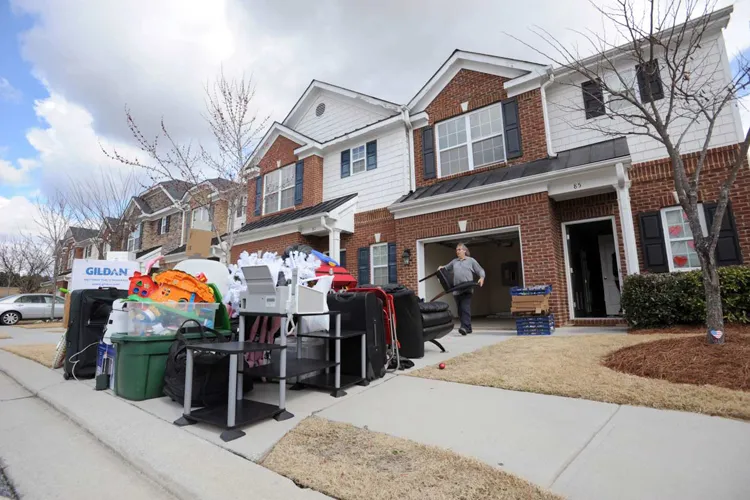The Eviction Process in New York (2022)
by SKU
Published: Dec 16, 2017 | Updated: Nov 8, 2022 |

Sharing is Caring!... Don't Care, Share & Save
How to Evict a Tenant in Buffalo NY
Eviction is a Legal Process. You the landlord CANNOT just call the police and have a tenant thrown out on the street because you want the tenant out. The tenant has the right to due process. There are two (2) types of evictions:
- Non-Payment
- Holdover
Non-Payment
A nonpayment eviction is an eviction for nonpayment of rent. Under New York State Law, a landlord seeking to evict a tenant for non-payment must first give the tenant a chance to pay, by personally serving the tenant a fourteen (14)-day notice in writing, stating that the tenant has fourteen (14) days to pay all the rent in full or the tenancy will be terminated.
Before the fourteen (14) day notice can be personally served, the landlord must have already sent a "Late Rent Notice" at a point when the rent is five (5) days past the due date. The "Late Rent Notice must be sent "via certified mail.
Holdover
A Holdover eviction is an eviction for remaining on the premises after the lease has expired, or remaining on the premises after receiving notice that the lease has been terminated because of a breach of the lease agreement, or after receiving notice that the landlord is terminating a month to month tenancy. If the Landlord wishes to terminate a month to month tenancy, the tenant will need to be personally served either 30, 60, or 90 days notice, depending on the length of time tenant has been residing in the property. If the tenant as resided for less than one year 30 days, if more than one year but less than two years 60 days, if more than two years 90 days. Breach of lease termination notices must also be personally served, but usually after the tenant has had an opportunity to cure, based on the terms of the lease agreement.
Eviction Procedure
Landlords beware. The landlord tenant law in New York is heavily weighted in favor of the tenant. There are strict procedural rules and if the tenant shows up to court with the back rent money he will not be evicted for non-payment.
Starting the Eviction
Regardless of the type of eviction, the procedure is mostly the same and begins when the tenancy is terminated. In a non-payment case the eviction can start after the fourteen (14) day notice has been served and no payment has been made within fourteen (14) days. The act of non-payment terminates the tenancy. The holdover eviction can start as soon as the lease expires, or tenancy is terminated because of breach, or after the expiration of the notice period in a month to month tenancy.
Filing the Eviction Petition
Once the tenancy is considered to be terminated the landlord may file in court for eviction. The landlord CANNOT go directly to the sheriff. The landlord must get a court order first. To get the court order, the landlord files a petition and obtains a hearing date. The hearing date MUST be no less than TEN DAYS from the date of service of the petition on the tenant. The hearing date is required to be scheduled between ten (10) and seventeen (17) days after the tenant is served with the petition.
Personal Service of the Eviction Petition
Personal Service is made by having a process server personally hand the petition to the tenant. If the tenant is avoiding service it may be made by nailing the petition to the door and sending a copy by mail (Nail and Mail - by Certified & First Class.) (Note: If service is made by nail and mail, and the tenant does not make a personal appearance in court, the landlord will be unable to get a money judgment on that day for the arrears in rent, however the landlord will get the warrant.)
The Eviction Hearing
The hearing is a summary proceeding. If the tenant appears in Court, typically the judge will adjourn the case for at least fourteen (14) days to allow the tenant time to get a lawyer. If the judge finds that the tenancy is terminated because of non-payment or for holdover the judge will sign a warrant of eviction. The landlord may also obtain a money judgment for the arrears due in rent if personal service was made or if the tenant makes a personal appearance in court.
The Eviction Warrant
Once the warrant is signed by the judge the landlord will then need to submit the warrant to the Marshal or Sheriff. The Marshal or Sheriff must give fourteen (14) days notice to the tenant before enforcing it. The landlord has no right to garnish wages without a money judgment. If the landlord does not get a money judgment during the eviction proceeding, he may sue the tenant in small claims court at a later date.
Tenant Files for Bankruptcy
A tenant may file for bankruptcy to prevent the eviction. If the warrant of eviction was issued prior to the bankruptcy filing the eviction needs to be cured and future rent needs to be posted with the bankruptcy court. In some cases, the filing of a bankruptcy case creates an automatic stay of the eviction proceedings against the debtor.
Sharing is Caring!... Don't Care, Share & Save